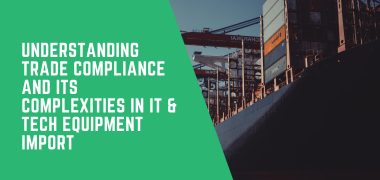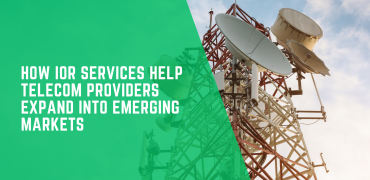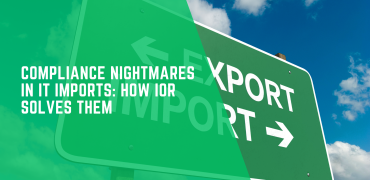In the fast-paced world of information technology and telecommunications, companies frequently need to import high-value tech equipment like servers, routers, and networking devices. However, the global nature of IT infrastructure deployment introduces a critical challenge—trade compliance. Managing the import of IT and tech equipment across borders involves navigating complex regulations, legal requirements, and customs duties, all of which can create hurdles for businesses if not handled correctly.
Why Is Trade Compliance So Complex for IT & Tech Equipment?
- Varying Regulations by Country Every country has its own unique import rules, standards, and safety regulations, particularly for technology products that involve sensitive data or telecommunications. For example, equipment such as servers and networking devices may need specific certifications, like CE marking in Europe or FCC certification in the U.S. Meeting these standards is essential to avoid fines or the rejection of shipments at customs.
- Controlled and Restricted Goods Many IT and telecom products are considered controlled or restricted goods, especially if they contain encryption technology or radiofrequency components. Importing such goods requires special permits and compliance with laws governing their use, as they may pose national security concerns in some regions. Failing to secure the proper licenses can result in severe penalties and delays.
- Customs Duties and Tariff Classification Tech equipment often falls into specialized tariff categories, which vary across countries. Misclassification of goods can lead to incorrect duty assessments, customs penalties, and shipment delays. Additionally, certain products may benefit from duty exemptions or reductions if classified under specific trade agreements, but accessing these benefits requires expert knowledge of tariff codes and regulations.
- Data Privacy and Security Concerns In many cases, importing IT equipment involves more than just hardware; it may include data processing or communication capabilities that raise concerns about data privacy and security. Some countries impose strict controls on the import and use of such equipment, requiring additional compliance measures such as data localization laws or cybersecurity certifications.
- Technology Export Controls Beyond import regulations, tech companies must also be mindful of export control laws from their home country, especially when dealing with dual-use technologies that have both civilian and military applications. These controls can limit where and how certain products can be shipped, adding another layer of complexity to the process.
How to Navigate Trade Compliance for IT & Tech Imports
Given the intricate nature of trade compliance in the IT and tech sectors, companies must adopt a proactive approach to avoid costly delays, fines, or compliance failures. Here are a few best practices:
- Leverage Importer of Record (IOR) Services: An IOR takes on the legal responsibility for the import process, ensuring compliance with local laws and customs regulations. This is especially helpful for tech companies importing equipment into countries where they don’t have a legal entity or extensive compliance knowledge.
- Understand Country-Specific Requirements: Each destination country will have its own standards and regulations for IT equipment. Businesses should invest in understanding these requirements or partner with experts who specialize in local trade compliance.
- Ensure Accurate Tariff Classification: Working with trade compliance experts to properly classify goods under the correct Harmonized System (HS) codes can help companies avoid customs issues and take advantage of applicable duty exemptions.
- Prepare Necessary Certifications and Permits: Many IT products need regulatory approvals or certificates before they can be imported. Companies should ensure that they have the necessary documentation, such as product safety certifications or cybersecurity compliance, well in advance of shipment.
Conclusion
Trade compliance in the IT and tech industry is a complex and ever-evolving landscape that businesses must navigate carefully. By understanding the challenges of varying regulations, customs duties, data privacy concerns, and export controls, companies can streamline their international operations and avoid costly missteps. Partnering with experienced trade compliance professionals or Importer of Record services is an essential step in ensuring the smooth and compliant import of IT equipment into global markets.
Staying informed and compliant not only protects businesses from legal risks but also helps them scale and grow in a globalized economy.




